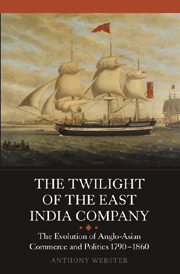 The Twilight of the East India Company
The Twilight of the East India Company Published online by Cambridge University Press: 12 September 2012
THE PASSAGE and implementation of the Charter Act of 1813 coincided with a period of great political turbulence in Europe and North America. Global events overshadowed what would amount to a revolution in Britain's commercial relations with India. Tensions with the USA erupted into war by the time the Act passed through Parliament. The tide of the conflict in Europe turned decisively in 1812 following Napoleon's disastrous invasion of Russia. Victory followed swiftly in 1814 and Napoleon was exiled to Elba. But Napoleon's escape led to a resumption of hostilities until his final reckoning against his enemies at Waterloo. There then followed the complex diplomatic negotiations at the Congress of Vienna, which redrew the political contours of Europe and the European empires in India and south-east Asia.
Without question the British had emerged from the war as the most powerful nation in the world. This was not merely a consequence of victory on the battlefield. Britain's impressive economic growth, already commented upon before the war, accelerated during the conflict. This was most evident in the continuing rise of British manufacturing industry, which was already conquering the markets of the world. But Britain had also established itself as the most important mercantile and financial centre in Europe. Indeed, one of the reasons for Britain's victory had been its ability to fund the campaigns of allies on the continent. In spite of the social and economic difficulties caused by the war, the British emerged stronger than ever, especially in respect of their empire.
To save this book to your Kindle, first ensure no-reply@cambridge.org is added to your Approved Personal Document E-mail List under your Personal Document Settings on the Manage Your Content and Devices page of your Amazon account. Then enter the ‘name’ part of your Kindle email address below. Find out more about saving to your Kindle.
Note you can select to save to either the @free.kindle.com or @kindle.com variations. ‘@free.kindle.com’ emails are free but can only be saved to your device when it is connected to wi-fi. ‘@kindle.com’ emails can be delivered even when you are not connected to wi-fi, but note that service fees apply.
Find out more about the Kindle Personal Document Service.
To save content items to your account, please confirm that you agree to abide by our usage policies. If this is the first time you use this feature, you will be asked to authorise Cambridge Core to connect with your account. Find out more about saving content to Dropbox.
To save content items to your account, please confirm that you agree to abide by our usage policies. If this is the first time you use this feature, you will be asked to authorise Cambridge Core to connect with your account. Find out more about saving content to Google Drive.